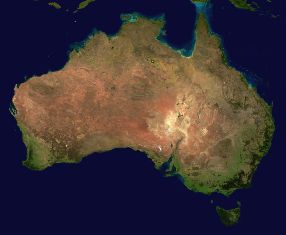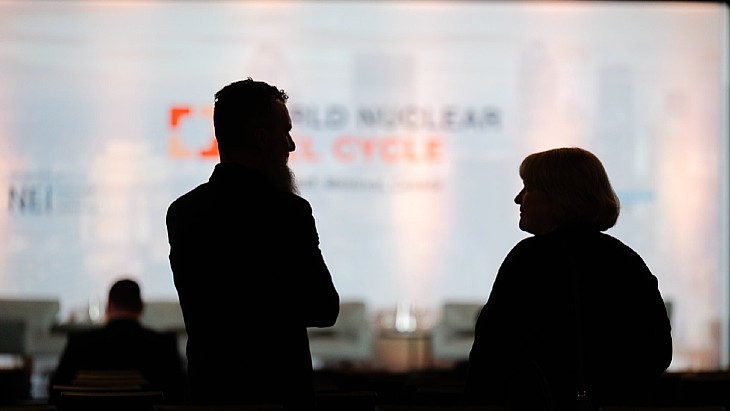Australian uranium debate
Friday, 27 April 2007
 Appeals for "common sense to prevail" have preceded thenational conference of the Australian Labor Party in Sydney. A motionwill be presented to end policies limiting uranium mining.
Appeals for "common sense to prevail" have preceded the national conference of the Australian Labor Party (ALP) in Sydney. A motion will be presented to end policies limiting uranium mining.
Appeals for "common sense to prevail" have preceded thenational conference of the Australian Labor Party in Sydney. A motionwill be presented to end policies limiting uranium mining.
Appeals for "common sense to prevail" have preceded the national conference of the Australian Labor Party (ALP) in Sydney. A motion will be presented to end policies limiting uranium mining.
 After months of controversy, the future situation of uranium mining in Australia could become more clear as the opposition ALP convenes for its national conference. Despite not currently holding power federally, the party controls all the deifferent states, enforcing its 'no new mines' policy by preventing mining leases being issued for uranium. Meanwhile, prime minister John Howard's ruling Liberal coalition increasingly supports nuclear power, and Howard's statements have sparked debate on both nuclear power and uranium mining.
After months of controversy, the future situation of uranium mining in Australia could become more clear as the opposition ALP convenes for its national conference. Despite not currently holding power federally, the party controls all the deifferent states, enforcing its 'no new mines' policy by preventing mining leases being issued for uranium. Meanwhile, prime minister John Howard's ruling Liberal coalition increasingly supports nuclear power, and Howard's statements have sparked debate on both nuclear power and uranium mining.
The ALP has made the decision not to support the use of nuclear power for electricity generation, but ALP leader Kevin Rudd is positive towards expanding uranium mining in the country that holds about 25% of the world's resources.
Deputy ALP leader Julia Gillard said: "This is an area on which views differ and they're deeply held." Several front-bench ALP members are said to be against expansing uranium mining, but Gillard told reporters: "I expect as I've always expected that Kevin Rudd's view will prevail." The vote is slated for late on 28 April.
A joint statement of the Australian Uranium Association and the Association of Mining and Exploration Companies (AMEC) has called for "common sense to prevail" and lead to a change in policy, but warned of further additions to safety regulations as a sop to anti-nuclear ALP members. Justin Walawski, AMEC's chief executive, said: "The existing ALP uranium policies contain extremely stringent environmental, transport and non-proliferation safeguards - probably the world's most stringent. There is little if any need to change them."
Further information
WNA's Australia's uranium and who buys it information paper
WNN: "Nuclear power is part of Australia's future"
 Appeals for "common sense to prevail" have preceded thenational conference of the Australian Labor Party in Sydney. A motionwill be presented to end policies limiting uranium mining.
Appeals for "common sense to prevail" have preceded thenational conference of the Australian Labor Party in Sydney. A motionwill be presented to end policies limiting uranium mining. After months of controversy, the future situation of uranium mining in Australia could become more clear as the opposition ALP convenes for its national conference. Despite not currently holding power federally, the party controls all the deifferent states, enforcing its 'no new mines' policy by preventing mining leases being issued for uranium. Meanwhile, prime minister John Howard's ruling Liberal coalition increasingly supports nuclear power, and Howard's statements have sparked debate on both nuclear power and uranium mining.
After months of controversy, the future situation of uranium mining in Australia could become more clear as the opposition ALP convenes for its national conference. Despite not currently holding power federally, the party controls all the deifferent states, enforcing its 'no new mines' policy by preventing mining leases being issued for uranium. Meanwhile, prime minister John Howard's ruling Liberal coalition increasingly supports nuclear power, and Howard's statements have sparked debate on both nuclear power and uranium mining.The ALP has made the decision not to support the use of nuclear power for electricity generation, but ALP leader Kevin Rudd is positive towards expanding uranium mining in the country that holds about 25% of the world's resources.
Deputy ALP leader Julia Gillard said: "This is an area on which views differ and they're deeply held." Several front-bench ALP members are said to be against expansing uranium mining, but Gillard told reporters: "I expect as I've always expected that Kevin Rudd's view will prevail." The vote is slated for late on 28 April.
A joint statement of the Australian Uranium Association and the Association of Mining and Exploration Companies (AMEC) has called for "common sense to prevail" and lead to a change in policy, but warned of further additions to safety regulations as a sop to anti-nuclear ALP members. Justin Walawski, AMEC's chief executive, said: "The existing ALP uranium policies contain extremely stringent environmental, transport and non-proliferation safeguards - probably the world's most stringent. There is little if any need to change them."
| The policies After strongly supporting uranium development, in the 1983 federal election the Australian Labor Party (ALP) won government. Then in 1984 the ALP National Conference amended the party platform to what became known as the 'three mines policy', nominating Ranger, Nabarlek and Olympic Dam as the only projects from which uranium exports would be permitted. Provisional approvals for marketing from other prospective uranium mines were cancelled. This ALP policy - which never became law- persisted until the change of government in 1996, despite the fact that Nabarlek ceased production by 1988. In opposition, the ALP's policy was modified to 'no new uranium mines when we get into office', allowing Olympic Dam, Ranger and Beverley to be unthreatened. SXR Uranium One's Honeymoon mine in South Australia had gained environmental approval in 2001, and now has full approval to proceed from 2008. In the Northern Territory, the government has exercised its rights to approve new uranium mines. All state and the Northern Territory governments are now Labor, and use the national ALP policy as a prime rationale to oppose uranium mining. The conspicuous exception is South Australia, whose ALP government has been positive about new mines. Apart from South Australia and theNorthern Territory, the main uranium deposits are in Queensland and Western Australia. Whatever happens regarding the national ALP policy, the Western Australia government is not expected to approve uranium mining for some time. |
Further information
WNA's Australia's uranium and who buys it information paper
WNN: "Nuclear power is part of Australia's future"
Most Read

International banks express support for nuclear expansion
Monday, 23 September 2024

Cabinet moves to reverse Italy's anti-nuclear stance
Monday, 3 March 2025

Sweden budgets for nuclear new build
Wednesday, 11 September 2024
.jpg)
Switzerland moves to remove ban on new reactors
Thursday, 29 August 2024
Podcasts & Features
Viewpoint: Reframing nuclear's talent challenge - why scarcity is a myth
Podcasts & Features Wednesday, 14 May 2025
Podcast: World Nuclear Fuel Cycle 2025 (Pt 2)
Podcasts & Features Tuesday, 6 May 2025





_79311.jpg)


